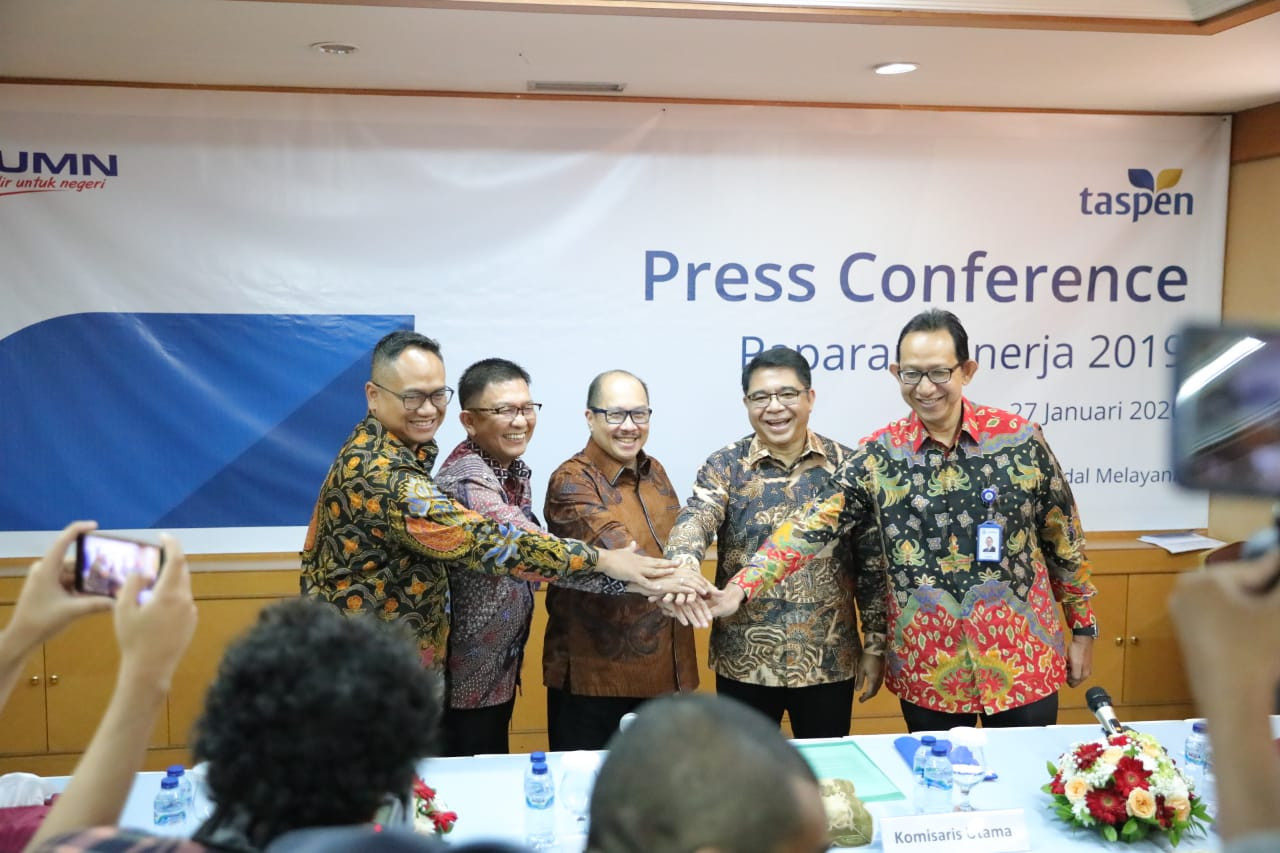State-owned insurer Taspen steers steady ship in industry rocked by turbulence
Taspen placed around 86.2 percent of its investments in low-risk assets with regular fixed returns.
Change Size
 PT Taspen president director ANS Kosasih (center) poses for a picture with members of the company's board of directors and board of commissioners during a press conference in Jakarta on Monday, Jan. 27. (Courtesy of PT Taspen/-)
PT Taspen president director ANS Kosasih (center) poses for a picture with members of the company's board of directors and board of commissioners during a press conference in Jakarta on Monday, Jan. 27. (Courtesy of PT Taspen/-)
S
tate-owned pension insurance company PT Taspen has followed a prudent investment strategy at a time when the industry has been rocked by alleged cases of investment mismanagement.
The company, which manages civil servant pension funds, placed around 86.2 percent of its investments in low-risk assets with regular fixed returns, such as government debt papers, corporate bonds and time deposits, last year.
It also allocated around 4.9 percent of its investment portfolio to equity and around 6.7 percent to mutual funds. However, it followed strict investment guidelines to place investments in these instruments, which are known to be more volatile than fixed asset instruments.
“We only put our money in liquid [blue chip] stocks on the [Indonesia Stock Exchange] LQ45 index and stocks with a market capitalization of at least Rp 2 trillion [US$146.9 million],” said Taspen president director ANS Kosasih on Monday.
As for mutual funds, the company only bought mutual fund products from the country’s top investment managers and continuously reviewed their performance to assess whether the fund managers’ practices were in line with the company's investment guidelines.
He said such an investment strategy was crucial to avoid the kind of investment mismanagement that has been rampant in the insurance industry recently.
The Attorney General’s Office (AGO) arrested five people earlier this month as part of its corruption investigation into state-owned insurer PT Asuransi Jiwasraya over alleged investment mismanagement. The mismanagement led to the insurer’s failure to pay to its customers a total of Rp 12.4 trillion in policies that had matured as of last December.
Meanwhile, the Supreme Audit Agency (BPK) launched an investigative audit on Jan. 20 into state-owned social insurer Asuransi Sosial Angkatan Bersenjata Republik Indonesia (Asabri) over alleged corruption following another case of investment mismanagement that caused the company to suffer Rp 10 trillion in losses.
The two insurance companies are known to invest in similar low quality stocks, whose prices are highly volatile. The Indonesia Stock Exchange (IDX) halted some cases of so-called pump-and-dump stock trading last week until “the companies fulfill their obligations to the IDX and the Financial Services Authority [OJK]”, according to a letter issued by the bourse.
Taspen’s prudent investment strategy and favorable capital market conditions enabled the company to book a higher profit last year.
The company’s profit jumped 43 percent year-on-year (yoy) to Rp 338.24 billion last year, thanks to the higher investment returns it booked during the period.
Its profit growth was almost three times its revenue growth of 16.63 percent last year, with the company booking Rp 19.28 trillion in revenue. It also surpassed its asset growth of 13.53 percent, with the company recording Rp 263.25 trillion in asset value in 2019.
Kosasih said the increase in profit and assets was due to the high investment returns it booked last year, where it recorded an average return of 9 percent, thanks to fairly favorable capital market conditions compared to 2018.
Last year, the bond market delivered a total return of 13 percent, as foreign investors rushed to buy Indonesian debt papers in search of higher yields at a time when developed countries maintained low interest rates.
Although the IDX’s main gauge, the Jakarta Composite Index (JCI), was only able to record 1.7 percent growth last year, the performance was significantly better than in 2018, when the index fell 2.54 percent.
“This is the fruit of our strategy and policy to always prioritize prudence and security when investing,” Kosasih said.
Insurance expert Herris Simanjuntak told The Jakarta Post recently that a prudent investment strategy was crucial for every insurance firm to ensure their investments could be used to pay out customers’ claims.
“The Financial Services Authority has even created investment guidelines for insurers to ensure safe and secure investment and prevent losses,” he said over the phone on Jan. 15.
However, he noted that the current guidelines were far from perfect, as insurance companies were only required to report the placements of their investments but not the details of their portfolios. He urged the OJK to impose stricter investment and reporting guidelines for insurers to prevent mismanagement, such as the Jiwasraya and Asabri cases, from happening again.
Separately, OJK chairman Wimboh Santoso said the regulatory body planned to create a new regulation that required stricter investment and risk management guidelines as part of an effort to enforce tighter supervision of all nonbank financial institutions, including insurance companies.
“We will soon issue a new risk-management guideline specifically aimed at nonbank financial institutions,” he said, adding that the OJK’s supervision would focus on risks, which include a company’s investment instruments, and not just its balance sheet.









